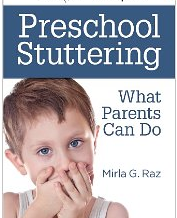Stopping the Stuttering Trajectory in the Preschool Years

The School Speech Therapist would like to welcome guest blogger Mirla G. Raz. I first became acquainted with Ms. Raz when I was asked to review her most recent publication Preschool Stuttering: What Parents Can Do. I was duly impressed with the book (you can read my review here). As it turned out I was already very familiar with Ms. Raz’s work since I had been using her books from her Help Me Talk Right series for years. The Help Me Talk Right Books continue to be a staple in my therapy room.
Ms. Raz has shared an excerpt taken from her newly developed course Stopping the Stuttering Trajectory in the Preschool Years available through Northern Speech Services. The course is designed to teach SLPs how they can help parents navigate the emotional and often confusing landscape of stuttering. Given that Ms. Raz’s book was so helpful to me, I believe her course will significantly add to your body of knowledge. Teresa
From Stopping the Stuttering Trajectory in the Preschool Years By Mirla G. Raz
Stuttering during the preschool years can be an easy problem to solve, one that may stop the child’s stutter before therapy is ever needed. We can do this by helping parents understand the disorder and advising them how best to communicate with their preschooler.
When parents hear their child stutter, their first inclination is often to intervene without professional input. They believe that what they do will help their child stop stuttering. They may not realize that their actions can be counterproductive. We can help parents by asking them to avoid specific interactions. We can help them by offering replacement interactions.
Below I have listed the interactions to be avoided:
- Speaking for the child.
- Finishing words or sentences for the child.
- Interrupting the child when he is speaking.
- Facial or body language that shows the child the parent is anxious or upset about the child’s speech.
- Asking the child to perform or recite in front of others.
- Talking about the child’s speech when others are present.
- Getting upset or distressed when the child stutters.
- Calling the child a “stutterer.”
- Limiting the amount of time the child has to speak or indicating that the parent is in a rush and does not have the time to listen.
- Bombarding the child with questions.
- Poking fun of the child’s speech or teasing him about it.
Parent can replace unhelpful interactions with the following:
- The parent should get down to eye level with the child and make eye contact.
- The parent should listen to what the child is saying.
- The parent should not interrupt the child or try to help him as he stutters.
- When the child is done talking the parent should comment on what the child has said, not how he has said it.
Mirla G. Raz has been working as an SLP for over 40 years. She is the author of the popular Help Me Talk Right books. Her most recent publication, Preschool Stuttering: What Parents Can Do is a comprehensive book designed to help parents understand stuttering during the preschool years. The book explains what happens when a child stutters, stuttering facts, the role of emotions and temperament in stuttering, the emotions and roles of the parents, what can cause the stutter to be better or worse, the impact of the child’s environment, when and where to seek professional help and more. The books are available through her website www.helpmetalkright.com and Amazon (see links below).








Very interesting. I’ve witnessed a few children in preschool that stutter. Thank you for sharing.
Thank you, Gina. Stuttering causes strong emotions in parents whose young children may be stuttering. I hope this book helps parents feel less anxious about their child’s speech and shows them how to positively deal with the disorder.